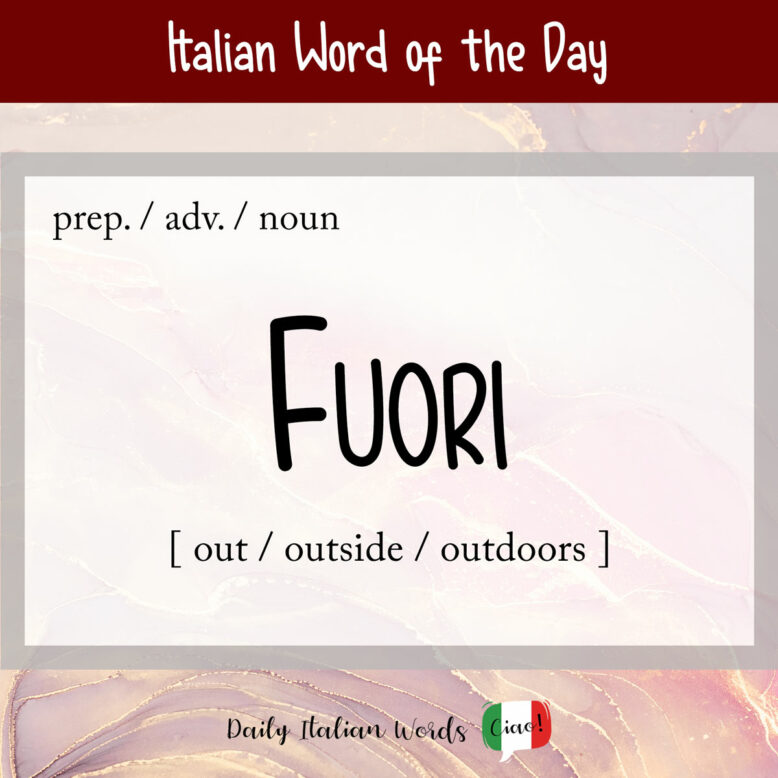Last week, we covered the word dentro (inside / in), so today, I thought we could talk about its opposite: fuori.
fuori
out / outside / outdoors

Fuori translates to out, outside or outdoors in English, and can function as either an adverb, preposition, noun or interjection. It comes from the Latin foris or foras.
When fuori functions as an adverb, it must accompany a verb. Here are some of the most common verbs you’ll come across. Keep in mind that some verbs take on meanings beyond the literal one you might expect—for example, cenare fuori can mean both “to eat outside” and “to go out for a meal.
- essere fuori = to be outside / out / out (of the house)*
- andare fuori = to go outside
- uscire fuori = to go outside
- cenare/mangiare fuori = to eat outside / to go out for a meal
- vivere fuori città / paese = to live outside the city / abroad
- vivere fuori casa = to live on your own (not at your parents’ home anymore)
- tirare fuori = to take out
- lasciare fuori = to leave out
- mettere fuori = to put out
- essere tagliato fuori = to be left out / excluded
- saltare fuori = to jump out / to come to light
*Before we move on, it’s worth mentioning that essere fuori also has a figurative meaning: to be crazy. It’s a shortened form of essere fuori di testa, which literally translates to “to be out of one’s head.” Essere di fuori, on the other hand, means to be a stranger, while essere in fuori means to stick out, and is normally used to refer to a person’s prominent teeth or eyes.
Sometimes you will see fuori preceded by lì and là, both of which mean there. In both cases, the translation is out there.
Cosa fai là fuori?
What are you doing out there?
Far fuori is a common Italian expression with multiple meanings depending on the context. It can refer to spending money, devouring food quickly, stealing, or even doing someone in!
Hai fatto fuori tutti i cioccolatini!
You gobbled up all the chocolates!
When fuori is used as a preposition, it is always followed by a noun. For example, you might say fuori città (out of town), fuori dalla scuola (outside the school), or fuori Roma (outside Rome). Needless to say, there are plenty of figurative expressions that use fuori in this way, some of which are similar to those we have in English:
- fuori pericolo = out of danger
- fuori mano = out of the way, remote (literally “out of hand”)
- fuori pasto = between meals (literally “out of meal”)
- fuori orario = outside working hours (literally “out of hour”)
- fuori programma = unscheduled (literally “out of program”)
- fuori commercio = not for sale (literally “out of market”)
- fuori tempo = to be out of time (music)
- fuori stagione = out of season
- fuori servizio = out of order
- fuori del comune = out of the ordinary
- fuori luogo = out of place
- fuori dubbio = beyond doubt (literally “out of doubt”)
- fuori strada = on the wrong track / the wrong way
- fuori di sé = beside oneself (literally “to be out of oneself”)
Questo distributore automatico è fuori servizio.
This vending machine is out of service.

Fuori, when used as a noun, is masculine and refers to the outside or exterior of a building or object. For example, il fuori della casa translates to “the exterior of the house.” A common expression is guardare or vedere dal di fuori, meaning “to look from the outside.” This phrase is often used figuratively to describe stepping back and viewing a situation objectively.
Per me è abbastanza difficile guardare la mia situazione dal di fuori.
It’s difficult for me to take a step back and look at my situation objectively.
Finally, fuori can also be used as an interjection. On its own—Fuori!—it means Get out! You might also hear expressions like Fuori di qui! (Get out of here!) or Fuori i soldi! (Hand over your money!).
Heather Broster is a graduate with honours in linguistics from the University of Western Ontario. She is an aspiring polyglot, proficient in English and Italian, as well as Japanese, Welsh, and French to varying degrees of fluency. Originally from Toronto, Heather has resided in various countries, notably Italy for a period of six years. Her primary focus lies in the fields of language acquisition, education, and bilingual instruction.


